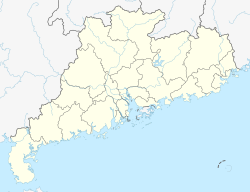Shangba is a village of about 3,300 people administered by Xinjiang Town in Wengyuan County, Guangdong.[1][2][3] It is an agricultural village, with rice and sugar cane being major crops. In 2007 the village acquired the nickname China's "Village of Death" [4] due to the extremely high incidence of cancer in its population.
Shangba
上坝村 | |
|---|---|
Village | |
| Coordinates: 24°27′39″N 113°48′48″E / 24.4607°N 113.8133°E | |
| Country | People's Republic of China |
| Province | Guangdong |
| Prefecture-level city | Shaoguan |
| County | Wengyuan |
| Town | Xinjiang |
| Shangba | |||||||
|---|---|---|---|---|---|---|---|
| Traditional Chinese | 上壩村 | ||||||
| Simplified Chinese | 上坝村 | ||||||
| |||||||
In addition, the local river, the Hengshui River, known locally as "The Dead River", is Shangba's only water supply, and it has become so polluted that it is endangering the health[clarify] of those living nearby.[5] One of the major pollutants in the river and well water is lead, which a provincial research institute reported as being present in the well water at some fifteen times what the national government set as a maximum acceptable rate for drinking water.[6]
The presumed source of the pollution is the Dabaoshan Mine for zinc, once Asia's largest mine for this mineral. The village's crops are also highly contaminated.[7][8]
In 2020 it was reported that over 1 billion Yuan was spent on soil remediation and improved mining processes, reducing the level of pollutants considerably.[9]
References
edit- ^ 新江镇 [Xinjiang Town]. National Bureau of Statistics of the People's Republic of China. 2013. Retrieved 3 March 2014. (in Chinese)
- ^ 2017年统计用区划代码和城乡划分代码:新江镇 [2017 Statistical Area Numbers and Rural-Urban Area Numbers: Xinjiang Town] (in Simplified Chinese). National Bureau of Statistics of the People's Republic of China. 2017. Retrieved 25 July 2018.
440229114204 220 上坝村委会
- ^ 新江镇 [Xinjiang Town] (in Simplified Chinese). XZQH.org. 1 September 2014. Retrieved 25 July 2018.
【2011年代码及城乡分类】440229114:{...}~204 220上坝村{...
} - ^ "China's 'cancer villages' pay price". BBC News. 17 January 2007. Retrieved 18 March 2014.
- ^ "CNN.com - Paging Dr. Gupta Blog". Cnn.com. Retrieved 14 November 2014.
- ^ [1] Archived 27 February 2008 at the Wayback Machine
- ^ "Red river brings cancer, Chinese villagers say". Cnn.com. Retrieved 14 November 2014.
- ^ "CNN.com - Transcripts". Transcripts.cnn.com. Retrieved 14 November 2014.
- ^ "抓环保 大宝山重获新生-新华网". www.xinhuanet.com. Archived from the original on 4 April 2020. Retrieved 12 February 2021.
